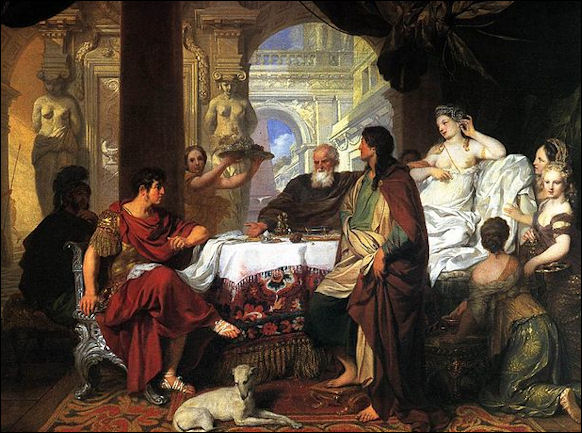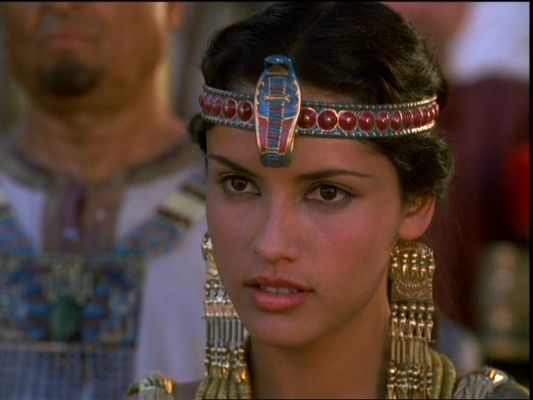
Advanced English Reading – Cleopatra and Marc Anthony: Duopoly
Good afternoon, in today’s advanced English reading class, we’re going to talk about a queen from the ancient world, in a story that involves beauty, suicide, forbidden love and violence; and the name of that queen is Cleopatra the seventh.
Cleopatra… the seventh?!!!… you say….That’s not possible… surely there was only one Cleopatra.
Well, there was only one famous Cleopatra but she was in fact number seven. And the next surprising news is that Cleopatra wasn’t even 100% Egyptian. You see, Cleopatra’s ancestors stretch back to the Ptolemaic dynasty. If you remember your history, Alexander the Great conquered Egypt and after his death the country was ruled by one of his generals, Ptolemy. Therefore, all the subsequent rulers were of Greek blood, and spoke Greek. In fact, Cleopatra was the first pharoah who could actually speak the language of Egypt, something she could do because as Plutarch tells us she was an accomplished linguist who spoke ‘eight languages fluently.’ Plutarch, that Roman historian who is always popping up in ancient history wrote, “It was a pleasure to hear the sound of Cleopatra’s voice which, like an instrument of many strings, could pass from one language to another.”
So, now we’ve established these little known facts about Cleopatra, let’s talk about her early life.
Well, like all Egyptian pharaohs she was the product of an incestuous relationship, which is not an uncommon feature of royal dynasties throughout history. The idea, of course, is members of the royal family only marry each other in order to maintain the purity of the bloodline. This meant that not only was Cleopatra created through intermarriage but she also had to marry her ten year old brother. Yuk! That’s one honeymoon video I wouldn’t wanna watch.
Anyway, she became queen at 16… but of course she was supposed to rule with her kid brother. To Cleopatra’s credit, though, she made it clear that not only was she not going to have a relationship with the boy… but she wasn’t going to share power with him. In 51 BC she did something very unusual and removed his name from all official documents, and his image from the coins. The tradition was that the female ruler be subordinate to the male but Cleopatra was the first to not accept this.
Unfortunately, though, much loved as she was, she made some powerful enemies. Many courtiers preferred her younger brother as he was easier to manipulate, so a conspiracy against Cleopatra in 48 BC meant she had to flee into exile, where she remained until the Roman civil war between Caesar and Pompey.
Pompey, who had ties with Alexandria in Egypt, fled there from Rome, and what happens next is a typical tale of the ancient world. The brother of Cleopatra – now sole ruler of Egypt – wants to gain favour with Caesar because he will soon be the next Roman leader. So he captures Pompey, chops his head off in front of front of his wife and children, and presents the head to Caesar when he arrives in Egypt.

However, what the 13 year old Egyptian forgot to take into account, was that yes – Pompey was an enemy of Caesar – but he was also the husband of Caesar’s dead daughter as well as a Roman consul. Furious, Caesar took the Egyptian capital and decided to make himself the arbiter between the young Egyptian king and Cleopatra. And this, is when the famous carpet incident takes place.
Cleopatra wants to meet with Caesar, but if she enters the palace she’ll be killed by her brother’s soldiers, so she enters the palace wrapped in a rug. The servant, who pretends he’s delivering the rug to the palace, enters Caesar’s quarters, unrolls the rug, and out pops the beautiful Cleopatra. Voila.
It’s said that he fell in love instantly. He was 52… she was 22. Obviously, he restored Cleopatra to the throne, nine months later she had his son (who was nicknamed little Caesar), and her brother was defeated in battle and drowned in the Nile.
So, she’s had a baby with the most powerful man in the world, she’s the queen of Egypt… surely she lives happily ever after.
Well, no one lives happily ever after in the ancient world. Especially not Caesar, who is murdered. And as soon as Caesar is dead, Cleopatra’s son is in danger because he’s one of Caesar’s heirs and the new ruler will kill all rivals.
What happens next is years of alliances, wars and political manoeuvring. It should be mentioned, though, as history focuses on her love life, that Cleopatra was an able ruler, steering Egypt through famine and various military conflicts.
The next major event, however, occurs in 41 BC when Mark Antony, one of the triumvirs now running Rome, summons Cleopatra to Tarsus to confirm her loyalty. Cleopatra arrives; but when you talk about Cleopatra arriving it’s the sort of glamour that makes Hollywood look modest: we’re talking… boats in the shape of swans, perfumed sails, and of course, the luscious Cleopatra herself.
And surprise surprise…
Marc Anthony falls in love at first sight.
Now, bear in mind that in the deal that carves up Caesar’s empire, Marc Anthony has to marry the sister of one of the other emperors, Octavian. But then he goes and marries Cleopatra and she has his baby. Twins. So he wasn’t really doing a good job of building good relations with his power-sharing partner. What happened next is that Mark Anthony is totally consumed by Cleopatra; they had another child and Cleopatra was named as ruler of various lands such as Armenia, Libya, Parthia, Syria and Cyprus, and given titles such as ‘queen of kings.’
Now, as you can imagine, back in Rome they started to get a little anxious and people said that Cleopatra was planning a war in which Mark Anthony and Cleopatra would proclaim themselves rulers of the world. Octavian started a war against Egypt in 33 BC to destroy this perceived threat. In 31 BC Anthony’s army fought against Octavian at the battle of Actium. Antony was resoundingly defeated and many of his remaining units deserted. Faced with humiliation and captivity in Rome he committed suicide and fell on his sword. He died in Cleopatra’s arms.
Once Mark Anthony was dead, Cleopatra was captured by Octavian. A high profile captive like Cleopatra, who was not a Roman citizen, would have been paraded through the streets of Rome and killed in the games: strangled in front of the crowd or thrown to the lions. Clearly, she could not let that happen, and she committed suicide. Despite the fact she had a guard to stop her killing herself, she was, as ever – clever and seductive. A snake was smuggled into her quarters. Cleopatra let the snake bite her and her suicide was complete.
But of course, the story doesn’t end there. What happened to the children: one from Caesar and three she had with Mark Anthony? Well, poor Ceasarion was strangled to death, but the other three were spared. Curiously, the three children were raised by Marc Anthony’s jilted wife.
Maybe the ancient world wasn’t quite as cruel as it seemed.
*
Okay, I hope you enjoyed today’s class of advanced English reading…now I’d like you to do your writing task for the week by visiting our website – advancedenglish.net or our facebook page – advanced English Ingocio – and tell us which historical person or period interests you most. Excellent… well, that’s all for today, don’t forget the writing task, and I’ll see you next week. Goodbye.
Vocabulary Focus
- Forbidden love amor prohibido: A love that is prohibited or considered unacceptable by parents or the authorities. “I’ve got tales of beauty, suicide, forbidden love and violence.”
- Indeed seguro: When used as a one word response in this way… ‘indeed’ means ‘I don’t doubt it.’ ‘I’m sure’. ROKEBY: “But I’ll admit it helps.” MONICA “Indeed.”
- First up primero: ‘First up’ is the first person in line to do something. “Who’s first up?”
- Accomplished consumado: When you put ‘accomplished’ before a skill or profession it means the subject was very good at this kill or profession. “So, she was an accomplished linguist.”
- Bloodline linaje: The descendants and future offspring of a family: usually a royal. “To maintain the purity of the bloodline.”
- Wrapped envuelto: To be covered in. The object most commonly wrapped is a present. “She enters the palace wrapped in a rug.”
- Unrolls desenrolla: If something is wrapped in a cylindrical form in a rug and you unwrap it, you are unrolling it. “Unrolls the rug, and out pops the beautiful Cleopatra.”
Out pops sale: when something suddenly appears from something else.
- Voila. A French word used to express surprise or satisfaction that something has appeared or been presented to you. “Voila.”
- Able hábil: Highly competent or skilled. “Cleopatra was an able ruler, steering Egypt through famine and various military conflicts.”
- Famine hambre (por todo el pais): A time when there is little food and the population begin to starve.
- Sails velas: The fabric attached to the mast of a boat used to navigate in the wind. In this case Cleopatra put perfume on her sails. “Perfumed sails.”
- Smuggled traficado: Entered illegally or in a concealed way. “A snake was smuggled into her quarters.”
- Spared salvado: If someone’s life is spared it means they were going to be executed but someone in authority allows them to live. “The other three were spared. The three children were raised by Marc Anthony’s jilted wife.”
- Jilted dejado: When someone ends a relationship with you.
Advanced English reading questions
- Who was Cleopatra’s first Greek ancestor?
- How do we know she was a brilliant linguist?
- What unprecedented actions did Cleopatra take upon becoming queen?
- What happened to her brother in the end?
- Give two examples of Cleopatra’s spectacular arrivals. Give some details.
Answers to the advanced reading
- Ptolemy
- Plutarch
- She removed his name from all official documents and coins.
- He was defeated in battle and drowned in the Nile.
- The rug and her arrival to meet Mark Anthony with perfumed sails and boats in the shape of swans.

Comments are closed.